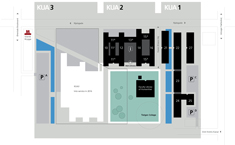International Seminar: A comparison of the Danish and Norwegian experiences in building historical life course databases
Seminar organized by Barbara Revuelta, Copenhagen Centre for Health Research in the Humanities (CoRe) and BioHistory Group, Saxo Institute.
Admission is free but registration is required as the space is limited (write to Barbara Revuelta, barbara.revuelta@hum.ku.dk, before September 23). The seminar will take place in room 24.0.47, KUA1, University of Copenhagen Souterhn Campus.
Reconstruction of life courses
In the last decades volunteers have transcribed millions of records that capture aspects of ordinary people in the past centuries, providing us an extraordinarily insight into their lives. With this material we can reconstruct how their lives looked like and get a deeper understanding of their experiences.
The novelty in this endeavour is that it is doable not only for hundreds but for thousands and millions of individuals, whose reconstructed life histories will allow us to answer questions we never dared to ask:
- How was their health?
- Did they climb higher in the social ladder than their parents or siblings?
- What did they die of, and do we find some similar social patterns across generations?
Rich information in Scandinavia
In Scandinavian countries, the sources for this type of research are particularly rich as information on the lives, relationships, events and deaths of individuals were systematically collected by different authorities for varying purposes: church books, censuses, military conscriptions records, hospital records, etc.
Discussion of reconstructing efforts
This seminar will discuss the recent efforts on reconstructing large databases of historical life courses that are taking place in Norway and Denmark.
The Historical Population Register of Norway aims to link the Norwegian censuses from 1801 onwards with the parish registers from the 18th and 19th centuries, and a great part of this work is carried out by the Norwegian Historical Data Centre at the University of Tromsø, The Arctic University of Norway.
The project of the Danish Historical Lifecourse Database is a similar undertaking, about to finish the pilot phase right now, focusing on 19th century Copenhagen aiming to create a similar infrastructure for Denmark as the Norwegian project. Researchers and staff involved in these two projects will discuss the scope, the sources and the methodological challenges of this type of undertaking.
Programme
- 9.00-9.20 Anne Løkke (KU)- Welcome and introductions
- 9.20-10.10 The two historical lifecourse databases
9.20-9.35. Bárbara Revuelta (KU): “The Danish Historical Life Course Database project”
9.35-9.50. Gunnar Thorvaldsen (UiT): “The Norwegian Historical Population Register”
9.50-10.10. Comments and discussion - 10.10-10.25. Helene Castenbrandt (KU): “Adding additional health sources: sickness funds information: the Swedish experience and our expectations for Denmark”
10.25-10.30. Comments and discussion - 10,30-10,45. Coffee break
- 10.45-11.25. Focus issues from Copenhagen
10.45-11.00. Nanna Floor Clausen (Rigsarkivet): “The Danish Demographic Database and its challenges”
11.00-11.10. Anna Mortensen (KU): “Studying causes of death from death certificates”
11.10-11.20. Markus Schunk (KU): “Adding layers to the the study of death: doctor’s life courses” - 11.20-11.50. Focus issues from Norway
11.20-11.30. Randi Eriksen (UiT): “Transcribing church records and population census”
11.30-11.40. Trygve Andersen (UiT): “Automatic Linkage”
11.40-11.50. Hilde Sommerseth (UiT): “Linkage by crowdsourcing” (www.histreg.no ) - 11.50-12.05. Closing discussion and final remarks

